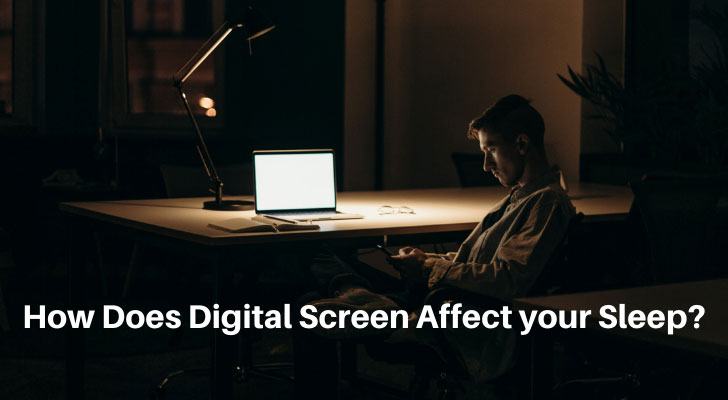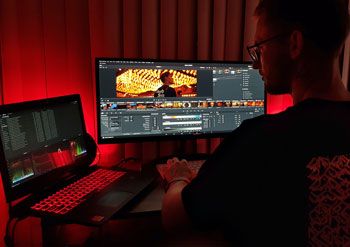Screens are part of our daily lives. In fact, they dominate the majority of the daily life of those who work online from home. The moment you wake up, you check for updates through our cellphones or tablets. You often find some job emails - client orders or urgent matters to be solved -received overnight, get up and switch on your desktop before anything else. At night while comfortably lying in bed, you check out your phone for updates, personal or business, or just incessantly scroll until you realize your body is exhausted but your brain is still wide awake. Really, how does digital screen affect your sleep? Screens are so embedded in our habits that we don't pay much attention to how it could really affect our sleeping patterns.

Did You Know?
- 90% of people use a digital device within an hour of bedtime.
- Blue light from screens can delay melatonin production by up to 3 hours.
- 60% of adults report experiencing sleep problems due to screen time.
- Teens who spend 5+ hours on screens are 71% more likely to have sleep issues.
- Screen use before bed can reduce sleep quality by 50%.
- Exposure to screens at night can cut REM sleep by up to 20%.
- 1 in 3 adults use electronic devices almost every night before sleep.
Effects of Screens on Sleep
There are several reasons why it is recommended that we refrain from using screens a few hours before sleep. Some principles are obvious, but when you work for yourself and have goals to achieve, you feel you need to make use of every working hour, you could intentionally violate it! Oftentimes, you cannot help but take your phone with you to bed to watch a show or read an ebook after the mentally exhausting day in your home office!
Here are some effects of screens and how to resolve it.
Bright Lights make it Difficult to Sleep
Mobile phones and tablets are so portable that we bring them everywhere we go. These devices, like laptops and televisions, emit blue light. Naturally, even without reading medical and scientific journals, we find it difficult to sleep when it's bright.
You can lower your screen's brightness to a minimum if you can't help using your phone before bedtime. Of course, it's still best to put down your phone or tablet a few hours before going to bed.
Did You Know?
- Screen time is linked to taking longer to fall asleep, with an average increase of 10 minutes.
- 45% of children are on screens right before bed, affecting their sleep patterns.
- Adults who frequently use screens at night may lose up to 1 hour of sleep.
- 30% of all adults and 40% of teens wake up in the middle of the night to check their phones.
- Constant screen exposure can increase the risk of sleep disorders by 48%.
- Blue light exposure at night can decrease sleep efficiency by 15%.
- Using screens before bed doubles the likelihood of requiring over 60 minutes to fall asleep.
CyberCash Wonderland

"I told you, no sex on the phone, Max!"
"Oh, sorry man, just doing some breathing exercises. Haven't slept in 2 days. I've got some zen music and all, and nothing works! I'm freaking out!"
"What time do you call this? And what drugs are you on?"
"Drugs? No way! Just screen time messing with my head. Eyes feel like they're gonna explode. What time do YOU call this David, it's 2 p.m."
"Oh, I'd better get up then. Look, breathing won't cut it. Shut down your laptop, get some real sleep. Music won't fight off sleep deprivation."
Screen Suppresses Melatonin Production
So, it turns out, bright lights have a physical effect that manifests in the form of sleeplessness. Melatonin is a hormone produced by the brain as a response to darkness. This signals the body that it's time to rest. Exposure to light at night blocks the natural production of melatonin. In essence, melatonin's absence or delayed production means that your body will not be ready for sleep and rest soon. This could translate to wakefulness or difficulty in sleeping.
Watching movies late at night, finishing up a project on your computer, or merely browsing over your mobile phone while lying on your bed can affect the production of the hormone melatonin.
To get that quality sleep, you may want to consider turning off screens at least half an hour before sleeping. The absence of a screen can promote melatonin production and help you fall asleep faster and get better sleep. If you want to take things to the extreme, get rid of screens inside your bedroom to eliminate temptation!
Stimulates your Brain

Whatever you are doing on your cellphone, laptop, tablet, or TV is keeping you awake. While you work, watch your favorite program, play games, your brain consistently churns information that keeps you stimulated. It heightens your concentration and challenges you to see it (your activity) to the end!
You could try destimulating your brain before bedtime - clear your mind and relax. Breathing exercise for sleep can help. Playing soothing music is another good idea.
Extends Sleep Latency
Sleep latency is the length of time it takes for a person to fall asleep. Sometimes, it's also called sleep onset latency. For normal adults, it takes about 10-20 mins before falling completely asleep. Twenty minutes may seem a bit too long if you think about it. But it's not like you are tossing and turning for 20 minutes before falling asleep! While falling asleep, you don't have a perception of how much time passed before you transitioned to your fully asleep state.
Exposure to bright lights and screens can potentially extend sleep onset. Refraining from electronic devices such as your mobile phone, tablet, TV, or computer before bedtime can help you shorten sleep latency and fall asleep faster.
Did You Know?
- Only 20% of people turn off their devices before bed, showing widespread potential for sleep disruption.
- Viewing bright screens before bed can lead to 10% less overall sleep in young adults.
- The use of blue light filtering features has been reported to improve sleep onset time by 8%.
- 25% of adults feel unrested upon waking due to late-night screen usage.
- 70% of people who limit screen time before bed report improvements in sleep quality.
- Nearly 50% of people admit that their sleep quality has decreased due to binge-watching shows late into the night.
Insomnia
One of the serious side effects of too much screentime is insomnia, which is medically defined as repeated difficulty falling asleep or maintaining sleep. This difficulty in sleeping prompts another problem; daytime impairment. Various factors can contribute to insomnia such as unusual sleeping patterns caused by traveling or work schedule and more serious underlying issues such as stress & anxiety or medical conditions.
Spending too much time on a digital screen can also lead to a sleeping disorder. The cause may not be as serious as pathological or psychological, but it can be a difficult one to fix. Depending on the type of online business that you run, you have set daily routines or customer orders to fulfill and deadlines to meet.
I will talk about how to get around it in a moment, but if you already have some symptoms of insomnia, the least you can do is to create a restful bedroom environment free of stress and distractions to promote sleep.

Manage Your Digital Screen Time For Better Sleep
You may not be able to cut back your screen time by simply reducing your working hours, but you can certainly work around it to help yourself a good night's sleep. So here are some ideas to manage the time you spend online;
Review and Monitor Your Screen Time
Track your screen time towards the end of the day. Mac, PC, and mobile devices will all let you check roughly what you've spent your time for so far and for which applications. This will allow you to review your online activities each day, hence improve your productivity (e.g. stop checking Twitter every half an hour), hence reduce your screen time.
Shift Manual Tasks To Evening
If you ever have any manual jobs to do - organizing paperwork, writing down/checking off your to-do list (mind you, I do everything on my laptop myself), then you can consider doing these in the evening after you shut off your computer.
Remove Screens from Bedroom
It's difficult if watching TV in bed before going to sleep has been part of your evening routine for a long time. But if you feel you're suffering from sleep deprivation, then try skipping the routine for at least a few nights and see if it improves.
You can also figure a few things out to stop your bedroom smartphone/tablet obsession, such as;
- Not bringing your phone/tablet to your bedroom at all.
- Mute your phone except for the morning alarm.
- Use it exclusively to play some ambient sleep-time music.
It's often suggested that reading a paperback will make you sleepy. I think it's true, though I don't necessarily agree with the idea (I wouldn't choose to read a book that makes me sleepy in the first place!)
Your bedroom is there for sleep, after all. It is possible to reduce your screen time dramatically by switching yourself off from work once you leave your home office and leaving all the visual entertainment in the sitting room.
